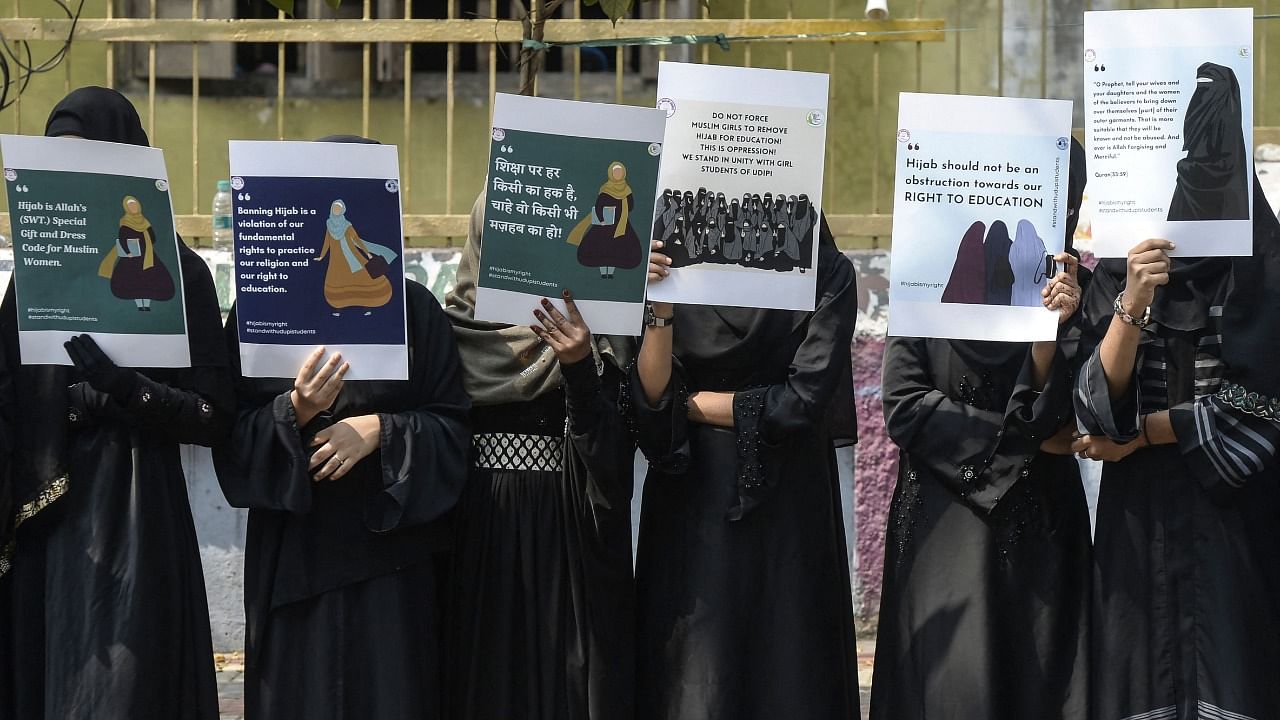
The hijab row, which started in Udupi, has now reached the Karnataka High Court, with students claiming that their constitutional rights are being infringed upon.
The counsel for those petitioning against the ban on hijab on Monday told the Karnataka High Court that the government can't curtail citizens' fundamental rights by claiming that the move is done to maintain public order.
But what does 'public order' mean and when can the state cite it to curb individual rights?
What Article 19 (1) and (2) state
The main contention of the petitioners is that Article 19 (1) guarantees their right to practice their religion and that "silently" wearing a headscarf does not constitute a disturbance of order, which is the grounds under which the government had temporarily banned religious displays till the court could resolve the issue.
Also Read — 'Religion more important than education'
Public order refers to a situation wherein people obey the laws or rules of the state, which is regulated by the Constitution of India. In several instances, the Constitution subjects fundamental rights of individuals in the larger interest of society or what it deems, is needed to maintain public peace and order.
The counsel for the petitioners contended that "subject to public order, morality and health and to the other provisions of this part, all persons are equally entitled to freedom of conscience and the right freely to profess, practise and propagate religion."
The argument involving Article 25
Article 25 of the Constitution guarantees "Freedom of conscience and free profession, practice and propagation of religion".
However, 25(1) states that the above freedom is subject to "public order, morality and health and to the other provisions of this Part, all persons are equally entitled to freedom of conscience and the right freely to profess, practise and propagate religion."
The counsel for the petitioners contended in the HC that wearing a hijab was not a violation of the article, as it does not affect the conditions mentioned under Article 25 of the Constitution.
On February 5, the Karnataka government, passed an order in exercise of its powers under Section 133 of the Karnataka Education Act, 1983, inter-alia directing that in colleges that come under the pre-university education department's jurisdiction, the uniforms mandated by the College Development Committee, or the board of management, should be worn and in the event, the management does mandate a uniform, students should wear clothes that are in the interests of unity, equality, and public order.
The counsel for one of the petitioners, Senior Advocate Devadatt Kamat on Monday argued in Court that the government can't restrict fundamental rights (of some in the interest of others) in the garb of maintaining public order.
The counsel also contended that a College Development Committee (CDC), comprising an MLA, which has been authorised by the government to decide the uniform is an "extra-constitutional authority." The counsel argued, "A CDC comprising an MLA is an extra-constitutional authority and a third party to decide what to wear. The government has assigned its responsibility to this third party."
He also argued that the "State is an outside authority, it cannot say whether wearing a headscarf is essential practise or not. It has to be seen from the view point of a believer."
"Constitution says Article 25 will be subject to public order. State says public order will be what is decided by an MLA committee. How can a state function be left to an MLA Committee? This is a mockery of fundamental freedom," Kamat argued.
https://www.livelaw.in/top-stories/hijab-ban-karnataka-high-court-db-hearing-muslim-islam-fundamental-right-erp-191915
Kamat stated that all Central schools run by the Central government are allowing the wearing of hijab and petitioners have been wearing hijab of the same colour as the uniform since long.
"The state has made a fatal error while referring to public order in its circular. There is not even mention of Article 25 in the quoted order by the government on the basis of which the circular restricting hijab is issued," he said.
He maintained that the state is an outsider when it comes to the point of belief maintaining that public order is an enshrined responsibility of the state and it can't deny rights and say because certain acts incite violence, they are restricting students from wearing hijab.
The Court hearing on Monday was adjourned after there was some deliberation on whether the government order actually meant 'public order' or not. However, after looking up official translations, it was submitted on Tuesday that the order did, in fact, cite public order (use of the word sarvajanik suvyavasthe) as one of its reasons for curtailing the wearing of religion-signifying attire. "sarvajanik suvyavasthe" is how the Constitution uses public order in Kannada.
Watch the latest DH Videos here: